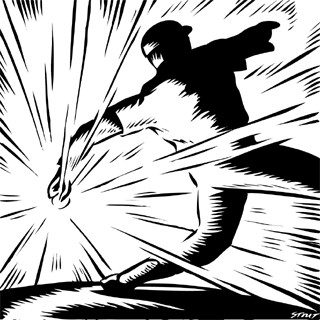An Activity of Alchemies
The alchemy of baseball makes possible the elongation and compression of time.
By Michael Ventura, Fri., May 11, 2001

It is the only physical contest in which many men are required to stand very still for indeterminate passages of time -- yet, while still, they remain intently in the action. That is the source and center of its beauty: a physical discipline of often blinding speed that demands, at its core, a talent for stillness. That's why macho athletes from whom one would not expect contemplative statements will tell you, as Atlanta pitcher Tom Glavine has said, "Baseball is mystical."
There can be as many as 19 men on the field, if the bases are loaded. Three outfielders, three fielders at each base, another (the shortstop) beween second and third, the pitcher, the catcher; an umpire at home plate, and umps at each base; a first base coach, a third base coach; a runner at each base; and a batter at the plate. Then there's the dugout and bullpen of the fielding team -- another 16 players, plus batting coach, pitching coach, bench coach, bullpen coach, and their third base and first base coaches, and finally the manager. Plus the 21 players in the batting team's dugout and bullpen, plus their coaches and managers. Let's see, that totals to: 66 people!
Some are moving, but only slightly: chewing various substances, shifting their weight from one foot to the other. Sixty-three of them are focused, for the moment, on three: the pitcher, the catcher, the batter. While the catcher -- who spends the better part of three hours in an impossible position, a crouch-on-tiptoe that no normal human being could sustain for five minutes -- wiggles his fingers between his immense thighs, making strange signs to the pitcher on a mound exactly 60 feet and 6 inches away.
Measure 60 feet and 6 inches, you stand at one end and someone crouches at the other, and watch that person wriggle his or her fingers quickly between their legs -- it's not so easy as it looks, making out that sign language.
Which is the reason for the pitcher's intense stare. He shakes his head. He shakes his head again. Now he nods his head. He's about to do something, but he's in no hurry.
Time has not exactly stopped, but it's become elastic, elongated -- which is not something that happens often in modern American technological life. Basketball, football, soccer, hockey, they look like how we live now: furious activity, racing against a clock, the game carefully timed, the clock running for the action, the clock stopping between spurts of action, stopping so long between the action (for powwows, referee judgments, commercials) that while these games are measured at one hour they actually take two or three to broadcast. In those sports, between the furious activity time goes dead. But in baseball ... there's no clock, no one is allowed to measure time. Time, in baseball, is what it used to be: an element that varies with the activity, something not quite in anyone's control -- as Tom Glavine has said, "Baseball does what it wants, when it wants; you never really know when a baseball game will end." All nine innings must be played; and more, if there's a tie; and an inning may take 10 minutes or an hour, no one knows. In fact, an inning of baseball is the only regularly scheduled television event that no one can measure or control -- it can take 10 minutes, it can take an hour, and during that time no one cuts in for a commercial except when a new pitcher takes the ball.
So the pitcher has nodded his head. And then the elasticity of time begins to stretch -- and they call it "a stretch," "he's going into his stretch," the announcer, the game's narrator, will say of the pitcher. The pent-up tension of the odd quality I call Baseball Time, a sense of time like no other, now literally stretches as the pitcher lifts his arms over his head and ... maybe fires the ball not to home plate, but to first base, where the runner has moved several feet off the base to get a good running start for second. The runner leaps or slides back to the base, usually beating the ball.
The crowd lets out an excruciating collective sigh, and maybe yells and boos with its frustration. The players shift around, take a deep breath, settle in once more. For now the stillness begins all over again: the signals, the nods, the stretch. It's really quite awful in one way, this waiting -- 'cause these sonsofbitches can do this three or four times in a row, as long as they feel it's necessary, following signals that no one else can decipher. In one way it's predictable, because you know that sooner or later the pitcher has to throw to home plate; in another way it's utterly beyond prediction, for in Baseball Time all is still suspended, elongated, until the pitcher goes into his stretch again and finally throws the ball toward home.
The ball is small and hard. It will travel toward the plate, across what is now a very small space -- 60 feet, 6 inches -- at speeds of anywhere between 65 and 100 miles per hour. The elastic has snapped. All that pent-up Time is now moving swiftly enough to kill. Sometimes the ball moves so erratically that the batter has to dive out of the way for dear life -- because if that object hits you in the head it really can kill you. It's only happened once or twice in the major leagues (unlike most baseball fans, I never remember the numbers), but it has happened.
The elastic has snapped and, if the pitcher has that vague quality called "stuff" or "movement," the ball moves as strangely as it does swiftly. Maybe it's a knuckleball, which moves (as has been famously described) "like a butterfly with the hiccups." Or it's a fastball, a 90-to-100-mile-per-hour statement. Depending on the skill of the pitcher, the ball slices, curves, moves quite incredibly in ways hard to master and all but impossible to predict -- the greatest pitchers can impart to even the fastest ball erratic variations, a kind of swiveling straight line, that (literally) defy physics. As Hack Wilson said of Satchel Paige's fastball, "It starts out like a baseball but when it gets to the plate it looks like a marble." Such alchemies are commonplace in the game. The batter swings -- and is considered a master at his craft if he can make contact with that ball a little less than one in three times at the plate. So even the great ones fail twice as often as they succeed. But let's say that this time he hits it.
If you watch a baseball game on television, the camera operators are so skilled that they make the trajectory of the ball seem inevitable -- which, like most inevitability, is an illusion. For if you're there, in the ballpark, you see that there's no inevitability about it. That ball can leave the bat in almost any direction (including straight backwards!), at any height (grounder, fly ball, line drive), and any speed.
Stillness has been turned inside out, has been transformed in an instant into its opposite: furious movement. Yes, it is an activity of alchemies. How often can you experience an element as intractable, as unmanageable, as Time ... and see it, actually see it, in an environment as controlled as a laboratory experiment and as uncontrolled as a barfight, see it express its extremes within instants? Yes, if Americans knew and felt as much about their government as they know and feel about sports, this Republic would be what Whitman imagined it could be, the marvel of the universe. Yes, it's bread-and-circuses, flim-flam, money and more money and more still; it's shameful, it's worse, it's immoral and insane, to spend money like that on ballplayers while children go hungry. There's no excuse for it. There's no saving grace. It may not have been a better world, but it was certainly a world that could be made more sense of, when ballplayers counted their pay in thousands instead of millions. Yes. There's no excuse for it. Wretched excess. And I may have to answer to my Maker for loving it so. Nevertheless, I can't feel apologetic for my love of that moment when one extreme of Time -- the "slowness" of the game that the uninitiated complain of, the sticky slow-motion quality that is the heart of this strange activity -- turns suddenly into its opposite: the elastic snaps, slowness becomes swiftness, everything depends on the participants' ability to shift suddenly from one form of being to its opposite. And why Yogi Berra has koaned, "Baseball is 90% mental; the other half is physical."
Love is shameless. Or it's not love. And that does not excuse, but it does explain, every wretched excess of love, even the love of the game. Hours and hours of watching time elongate and snap, elongate and snap, all because of a silly little ball. And that delicious contradiction: to enjoy this sense of Baseball Time you need to be willing to waste your time, irrecoverably. In an instantaneous PC/cell phone world, to play or watch a game is to give oneself up to a sense of time utterly at odds with how most of us live now. In a world that has made even Time a commodity, measured and paid for, this mere game elongates then compresses Time into a hard ball of uncertain trajectory, going going gone. ![]()








